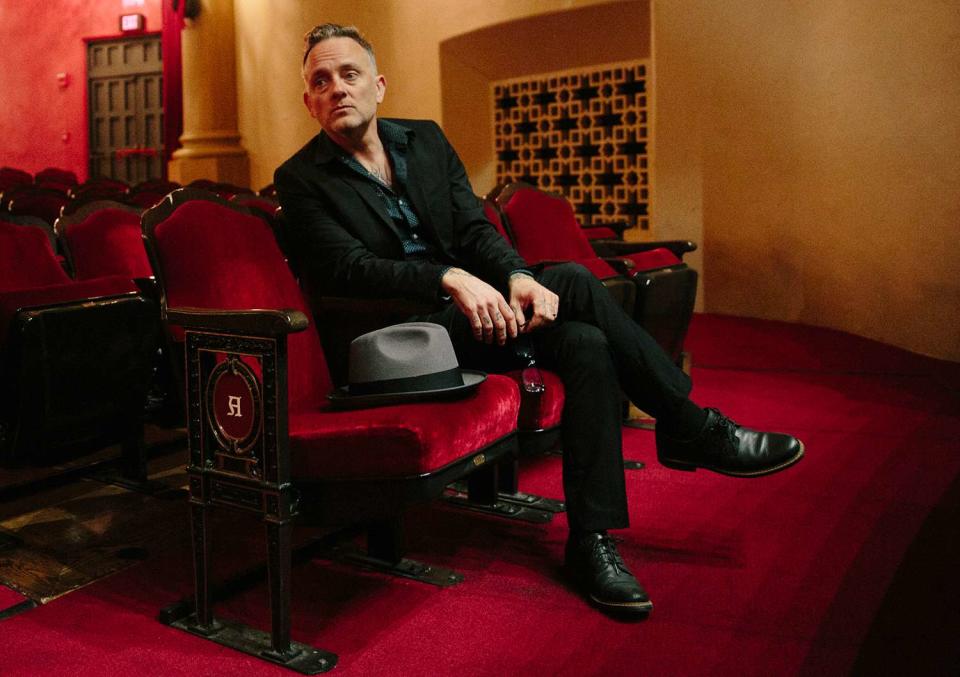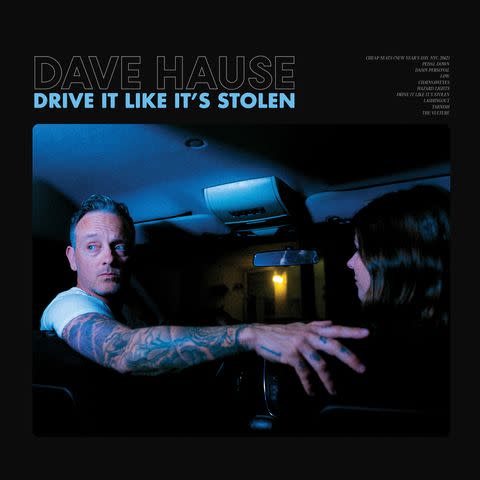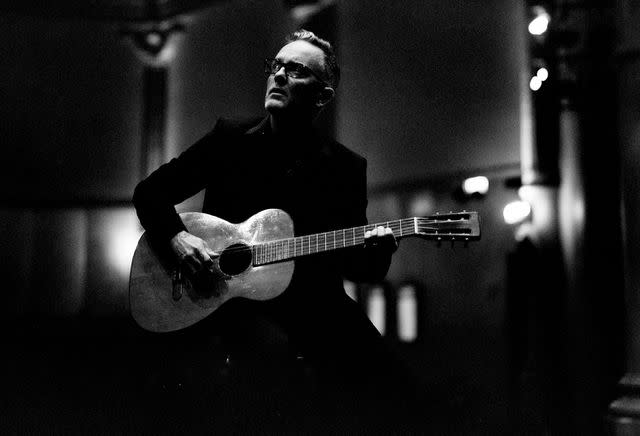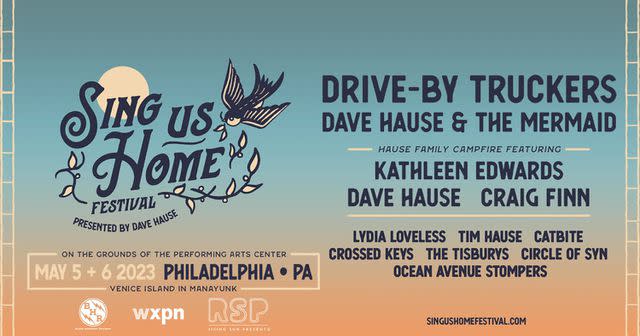Dave Hause Is Back in the Front Seat on 'Drive It Like It's Stolen' (Exclusive)
PEOPLE caught up with Dave and his brother Tim about writing the new record, keeping things personal and bringing the music back to Philly with their own festival

Dave Hause is back at it — this time not only with a new record in Drive It Like It's Stolen, but also having produced May's Sing Us Home Festival with his favorite collaborator: his brother Tim Hause.
The now California-based rocker takes fans on a journey with Drive It Like It's Stolen and his ultra-personal songwriting, teaming up again with co-writer Tim and producer Will Hoge to fully embrace the light, dark and everything in between. And as if putting out a new album wasn’t enough, Dave and Co. have taken on the challenge of bringing a "family reunion" style music festival to Philadelphia. The Drive-By Truckers, Kathleen Edwards and many more took the stage with the Hause brothers on Venice Island this spring to kick off festival season with the best of Americana.
PEOPLE caught up with Dave and Tim to chat about writing Drive It Like It's Stolen, keeping things personal and bringing their music back to Philly.
PEOPLE: As your sound as evolved over the last few records, what was new on Drive It Like It’s Stolen?
Dave Hause: A major thing happened. I can only see it as major in retrospect, but Tim decided to make his debut record, which came out in January. In doing so, he decided to go to Nashville on his own and make that with Will Hoge. In other words, I wasn't there.
And as he started to make some of those aesthetic choices apart from me in order to craft his own record, his own narrative around that record, it sort of reinvigorated me to understand now that there's two lanes of creativity. There's Tim's lane and there's my lane. Obviously, there's a huge Venn diagram that overlaps the two, and we write all the songs together, so that's the main thing where they cross-pollinate. But as artists, the things we decide to do in the recording and the presentation of the aesthetic are different, and those things reflect our own kind of tastes more specifically.
Going in to Drive It Like It's Stolen, I was like, "Well, wait, I don't have to make quite as much
room for Tim in the presentation, because he's got his lane." I think on KICK, and Blood Harmony in
particular, I was trying to make as much room for his songwriting and his aesthetic as I could, because it was feeling more and more like a duo or a team or whatever. Now, with that new open lane, I feel like we can be more ferocious in our presentation and have it specific to our individual view. So that was a major breakthrough.
In fact, in the studio I could kind of feel it. At different points, I would ask Tim, "Well, what do you think?" His response about a specific lyric or a specific sound or whatever was not what I would do. And on previous records I would be like, "All right, well, I got to synthesize this in." On this one I was like, "Nah, this is what I want to do."
It gives me a new appreciation for our working partnership and a new severity with my own creativity.

Tim Hause: The cool thing about the fact that this is a family business is some of these things don't get overtly communicated. I think that because of the DNA sharing that we have and the fact that we work so closely together and we're best buds, along with being brothers, we didn't really overtly say that.
That wasn't explicitly said during the Drive It Like It's Stolen session, but I was feeling it going in as well. To be quite honest, when Dave would ask me for my opinions, I found myself being way less assertive with what I thought and way more like, "Hey dude, I'm going to be in the back of the vehicle." As before it might have been like, I'm in the passenger seat, this is a little bit more like copilot, this is a little bit more sidecar. It's like, "Dude, we made the songs together." And that's where it's back and forth. There's no one guy's opinions are front and center and the other guy's behind.
But in this case, I felt like I had sort of gotten my own creative rocks off with my recording of my record, and then I wanted to have Dave do the same even though that I was still present. So it was cool to not actually communicate that, but just have the vibe sort of lead that way.
PEOPLE: I love that this is such a personal and family-driven career for you guys. Do you plan on staying that path for the next record?
DH: It was interesting. We did an interview together for a podcast with a friend of ours, and he was sort of suggesting... He's in a popular band where a lot of the goals with each record are get on the radio and really sell as many records as possible. All that's great, that's totally worked for them, but one of the things he was asking Tim and I was like, "Why don't you guys just call yourselves the Hause Brothers, really sift all the material down to the best songs and go out there and give them the best chance you can get to be the most whatever, successful or popular?"
And I took it in and thought about it for a second, and Tim and I talked about it later. I was like, "I
just don't want to do that." I like making songs. I like making a lot of songs, especially if I'm making them with Tim. I like painting lots of different paintings, so to speak, and I realize that commercially there's going to be some songs that are just catchier or some songs that connect with people more. I mean, one of my favorite songs on Tim's record has the least amount of plays but doesn't make me like it any less.
By doing the opposite of what our friend was suggesting just in that moment, I think it's great. It gives us more opportunity to every year or so, every two years, to put a notch in the tree of, "We were this tall when we made this record" or "This was where we were at." And in order to do that, it's going to take two of us to keep up with the songwriting ideas. It's certainly going to take two of us to keep cutting that many songs and putting them on records, and then getting them to people.
It is a family business in that our hands are touching almost every aspect of what we do. I don't really foresee changing up what's working so well now, other than maybe to bring in another person here or there. We had some success on Drive It Like It's Stolen by having our friend and bass player in The Mermaid, Luke, write on a couple songs. I quite like "Hazard Lights" and "lashingout."
TH: Yeah, the commercial viability of something is way less meaningful to both of us. Because we have ownership of the things that we do, we're more compelled by making things that are more
accurate, like forms of self-expression or more adventurous, or you could kind of fill in that blank based on the time period that those things are happening in.
That's the freeing thing about the fact that we own what we do and it's a machine that we created. And while it might not be a big machine, it's the one that we care about and we sweat into and all those things, so the number of plays becomes less important.
DH: Let's face it too, rarely do you get your favorite sandwich from a Quiznos. You typically get it from a local deli. And I think that analogy for the way we do business is true. We're hoping to make your favorite sandwich — not the most popular sandwich.
PEOPLE: Speaking of personal, you really got after some topics that hit close to home for you. What was going through your head as you're getting into the songwriting on this record?
DH: There was a bit more of a foray into trying to write from different perspectives, whether that's in the future or in the past. For instance, the first song is the potential of writing about leaving a major city in America 20 years from now, because assuming that the decay continues, that's a new perspective. And then "Hazard Lights" was looking at the moment you're making a decision to make a change, and that's going into the rear view, going into the past.
There was some new kind of territory in terms of what perspective I'm writing from. But more or
less, the tone of the record comes from emerging last year back to work finally and going into American cities. We're on tour with our band and going into the San Franciscos and New York Citys and seeing in real-time how the American experiment is looking kind of banged up and scary.
And I think with Blood Harmony being such a ... "I love having these twins, my wife and I are home, I miss my brother. What are the things that tie us together?" This was all happening during quarantine and being at home. This record is me sending the kids off to preschool and going back to work and going, "I don't know about this world we're about to raise these kids in. Do we have a future as a species? Do we have a future as a country? Do we have the future as a family?" Those questions were a lot more pressing for me and a lot more terrifying. And so you get a different tone with Drive It Like It's Stolen.
You get back to that kind of age-old theme for me, which is "this doesn't seem right" and my response to it is never that comfortable. To drive anything like it's stolen is not a comfortable response to the world around you.

Related: Summer Music Festivals 2023: Everything You Need to Know About Where to Find Your Favorite Artists
PEOPLE: Tell me a little bit about how you guys got the idea of starting your own festival.
DH: The whole thing is a challenge. It is not for the faint of heart to want to have a music festival anywhere, but specifically in the city of Philadelphia. Most of them have not worked. There's a couple that are longstanding — I think JAY-Z's is still going [with Made in America]. We are from there, and I just felt like it was time to celebrate the culture around which we've done things.
When Tim headlined his Philadelphia show on his record, it really felt like a family reunion. There were people there from my high school years, from his high school years, there were friends and family and everybody was hanging out. And it just felt like a little preview of what the festival could be, wherein we have our friends who brew beer, our friends who make pierogies and sandwiches and whatever we think is cool and delicious in town. And then in terms of the lineup, we just thought, "Hey, what would we want to see? What would we want to be involved in? How do we want to frame our own artistic output?"
Most people at this point think if they're secondary or tertiary fans of Dave Hause they're like, "Oh, that's the guy who we'll see with the Bouncing Souls or Gaslight." And I'm like, "Yeah, that makes sense to me, but also, so do the Drive-By Truckers." It's American rock and roll. That's what we're doing. It also makes sense for Tim to play on a bill with Kathleen Edwards and Craig Finn. And so we put our heads together with our friends at Main Street Music. They own the record store down in Manayunk. And we're like, "Where should we do this? Can we do it in Roxborough-Manayunk? We're looking for spaces." And then we found Venice Island, which when I was a kid was where you would go break bottles and smoke joints. And now it's this beautiful little island on the Schuylkill River. And one thing led to another.

Our manager deserves a lot of credit for chasing the idea down. And then Tim and I are involved for two reasons: sculpting it into making it feel like that family reunion vibe, and then also the boots on the ground. Tim's taking 4x6 cards to shows and running errands. I'm busy posting about it and interfacing with tons of the people that are vendors and things like that. And so it's really cool in that we're community organizing. You're sort of collecting this consensus of people, your constituents, so to speak, of like, "Hey, we're doing this thing. We really want you there. We really want you to come."
Hopefully, it'll feel more like that family reunion thing than your typical rock festival. I mean, we've played a lot of rock festivals. And some of them are cool, some of them are not so cool. And typically the thing that makes them cool are the small details where you think about the audience, like you know somebody thought about the audience when you attend Austin City Limits, whereas there's certain other ones in England or whatever where you're like, "Oh, we're all in a dirt field and it's kind of every man for himself." It's a little bit Lord of the Flies.
We're trying to avoid that and put our own stamp on the neighborhood and our own stamp on the Philadelphia music scene and see what happens.
Drive It Like It's Stolen is available now.
For more People news, make sure to sign up for our newsletter!
Read the original article on People.

 Yahoo News
Yahoo News 
